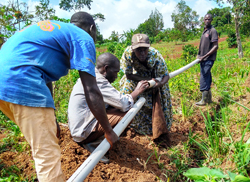
Up to 400 families are benefiting from an initiative supported by the African Development Bank to allow all-year crop farming in Mosiro.
To get to Mosiro from Nairobi, the easiest route is to take the escarpment road to Naivasha. At Mai Mahiu, you turn left towards Narok and drive until Ntulele market. Here you turn left again and get off the tarmac and what seems to be the end of civilisation.
The road to Mosiro is really rough. In the dry season, it is dusty. During the rainy season, it is muddy and only four-wheel vehicles will manage it. After what seemed like an eternity, we arrive at the Mosiro Irrigation scheme, which is changing the lives of people here who are mostly pastoralists.
Mosiro ward in Narok County has a long history of famine, especially during droughts when hundreds of livestock die and people migrate to other areas to look for water and grass. However, the government, in conjunction with African Development Bank (ADB) intends to change this by funding 1,200 acres of irrigation land at a tune of Sh170 million to benefit the locals. Families have been allocated land ranging from two to five acres on which they grow food and cash crops.
Some 400 families are beneficiaries and there are plans to increase the land under irrigation to include more.
The project was an eye opener to us as we do not only get food from it but also money. We sell the vegetables to middle men who later sell in towns,” she said. Through her earnings, Kuret has purchased 20 broiler chickens whose eggs she sells to the locals to boost her income.
Drawing water from Ewaso Nyiro River, the scheme that was launched in 2013 has not only come as a blessing to the locals, but to the entire country as horticultural crops grown through irrigation are consumed country wide. Evelyne Kuret, a farmer in the scheme, said before the project was established her children did not have adequate food and most of the time the family slept on empty stomachs.
“We mostly ate ugali and milk, but during dry seasons when the livestock had to migrate to other places because of lack of grass and water, we would boil the dry maize and feed our children,” she said.
Kuret owns a two-acre piece of land on which she grows vegetables and maize to feed her family and sell surplus to buy other household goods.
“The project was an eye opener to us as we do not only get food from it but also money. We sell the vegetables to middle men who later sell in towns,” she said. Through her earnings, Kuret has purchased 20 broiler chickens whose eggs she sells to the locals to boost her income.
Samson Katoo, another farmer on a five-acre piece of land, grows tomatoes and cabbages throughout the year, recording hefty income.
“I use approximately Sh120,000 per acre of tomatoes to buy inputs and labour. During good seasons, one acre gives me up to Sh1 million. The lowest I have ever got from an acre is Sh300, 000,” he said. The performance of his children in school also improved as they now eat nutritious food as opposed to earlier times when they would only afford one unbalanced meal in a day.
“In addition, I have bought a 50 by 100 ft plot at Ntulele market using the income I get from farming and I am planning to build rental houses,” said Katoo.
Mosiro Assistant Chief Peter Meikasi said crime rates had decreased in the area since the project started five years ago, as people are mostly busy on their farms.
“Before there were numerous cases of petty theft and burglary which have tremendously reduced after the irrigation project was started,” he said.
Meikasi, who also grows water melons and butternuts at the irrigation scheme, said he gets a profit of up to Sh300, 000 in one acre per season.

Extension officers regularly visit the project to train farmers on the best farming methods. But all is not rosy as there are some challenges. Meikasi said these include wild animals that destroy the crops and the poor road network that makes it difficult to get the produce to markets.
“The project is not fenced and occasionally elephants, baboons, zebras and antelopes come to eat our crops.
We incur huge amount of losses as the Kenya Wildlife Service (KWS) has never compensated any farmer for the loss. This has led to many farmers building semi-permanent houses at the project so as to guard their farms,” he said. He appealed to the county government to help in fencing the scheme with electric fence to keep the wild animals out.
The chief also complained that during rainy seasons, the farmers experience challenges as their crops are swept by flash floods incurring heavy losses. In a bid to boost production, Narok Governor Samuel Tunai has pledged that his government will expand the scheme to ensure every family is allocated at least 20 acres of farming land. Tunai said only 400 families were benefiting from the project but promised to increase the size of irrigation land to accommodate more farmers.
“The scheme is aimed at ensuring there is a steady food supply in the area for locals who are predominantly pastoralists and are greatly affected by drought,” he said.
The governor promised to give quality subsidized seeds and fertilizers to the farmers and has set aside Ksh15 million to fence the scheme in a bid to protect the crops from wild animals and theft. Other crops planted at the scheme include French beans, potatoes, beans, bulb onions, bananas, watermelons and capsicum. – Kenya News Agency
